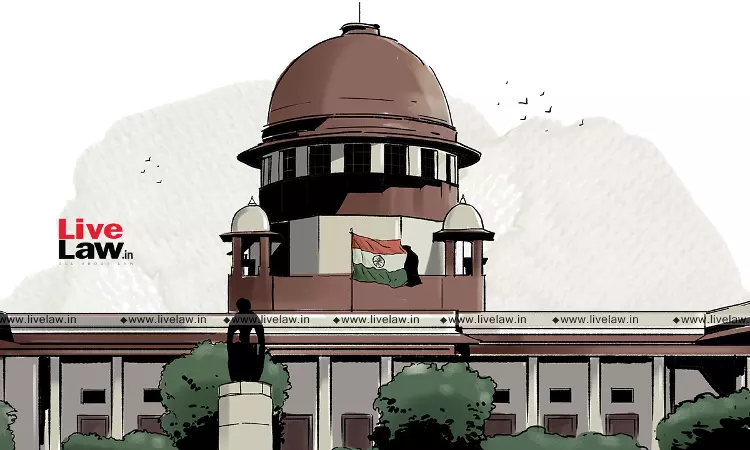- Home
- /
- Supreme court
- /
- Parties Who Consented To...
Parties Who Consented To Arbitration Estopped From Opposing Award On Ground Of Non-Arbitrability : Supreme Court
Yash Mittal
17 Aug 2025 3:39 PM IST
The Supreme Court recently held that in disputes concerning trusts, once a party voluntarily submits to arbitration and accepts a consent decree, the doctrine of estoppel applies, making it impermissible for that party to challenge later the decree on the ground that such disputes are non-arbitrable.The bench comprising Justices Augustine George Masih and Atul S. Chandurkar heard the case...
The Supreme Court recently held that in disputes concerning trusts, once a party voluntarily submits to arbitration and accepts a consent decree, the doctrine of estoppel applies, making it impermissible for that party to challenge later the decree on the ground that such disputes are non-arbitrable.
The bench comprising Justices Augustine George Masih and Atul S. Chandurkar heard the case where the dispute arose among trustees of the Guru Tegh Bahadur Charitable Trust. The respondents had initially filed a suit for perpetual injunction, but the Trial Court rejected the plaint under Order VII Rule 11 CPC, holding the suit barred under Section 92 CPC. During the pendency of appeal, the parties moved an application stated that they had resolved their disputes through arbitration and requested that the matter be disposed in terms of the settlement. Thus, the arbitration agreed award was incorporated into a consent decree by the District Court.
When the appellants sought interim measures under S.9 of the Arbitration Act in terms of the award, the respondents challenged its validity, claiming disputes involving charitable trusts were non-arbitrable. Both the Commercial Court and the High Court held in the respondent's favour, declaring the award a nullity, prompting the Appellant to move to the Supreme Court.
Setting aside the impugned findings, the judgment authored by Justice Chandurkar observed that since the Respondent had accepted the consent decree and derived benefits from it, making the Appellants withdraw the FIR and parted some amounts as part of the consent decree, now it would be impermissible for the Respondent to challenge the validity of the decree, questioning the arbitrability of dispute.
“It is only because the respondents consented to have the disputes resolved through the arbitration of Mr. Vipin Sodhi that the compromise deed was executed and the respondents' appeal was disposed of accordingly. The appellants thereafter acted in accordance with the terms of the consent deed and altered their position to their detriment. They took steps to withdraw the First Information Report and also parted with substantial amounts as required by the consent deed. All these facts are sufficient to hold that after the parties accepted the consent deed, the appellants acted in accordance with its terms and altered their position. The respondents thus by their conduct of accepting the compromise deed based on the award of the arbitrator are now precluded from questioning its validity.”, the court said.
“We therefore find that on the doctrine of estoppel by conduct and election the respondents cannot be permitted to now raise a plea that the compromise deed based on the award dated 30.12.2022 was a nullity in view of the provisions of Section 92 of the Code.”, the court added.
The Court further held that the Respondents cannot be allowed to approbate the consent decree and then reprobate the same, as it would undermine the Appellants' interests, and violate the principle of estoppel.
“The conduct of the respondents of approbation by first accepting the award and having the appeal disposed of on that basis and thereafter of reprobation by setting up its invalidity has been lost sight of… The respondents having succeeded in having a decree being passed on the strength of the arbitral award dated 30.12.2022 now cannot be permitted to contend that the award itself was a nullity.”, the court said.
In light of the aforesaid, the Court allowed the appeal and revived the Appellant's execution proceedings in terms of the consent decree.
Cause Title: SANJIT SINGH SALWAN & ORS. VERSUS SARDAR INDERJIT SINGH SALWAN & ORS.
Citation : 2025 LiveLaw (SC) 810
Click here to read/download the judgment
Appearance:
For Petitioner(s) :Mr. C. U. Singh, Sr. Adv. Mr. Punit Dutt Tyagi, AOR Ms. Smriti Sahai, Adv. Mr. Shikhar Tyagi, Adv. Ms. Pragati Singh, Adv.
For Respondent(s) :Mr. Gagan Gupta, Sr. Adv. Mr. Sanchit Garga, AOR Mr. Amit Wadhwa, Adv. Mr. Shashwat Jaiswal, Adv.



